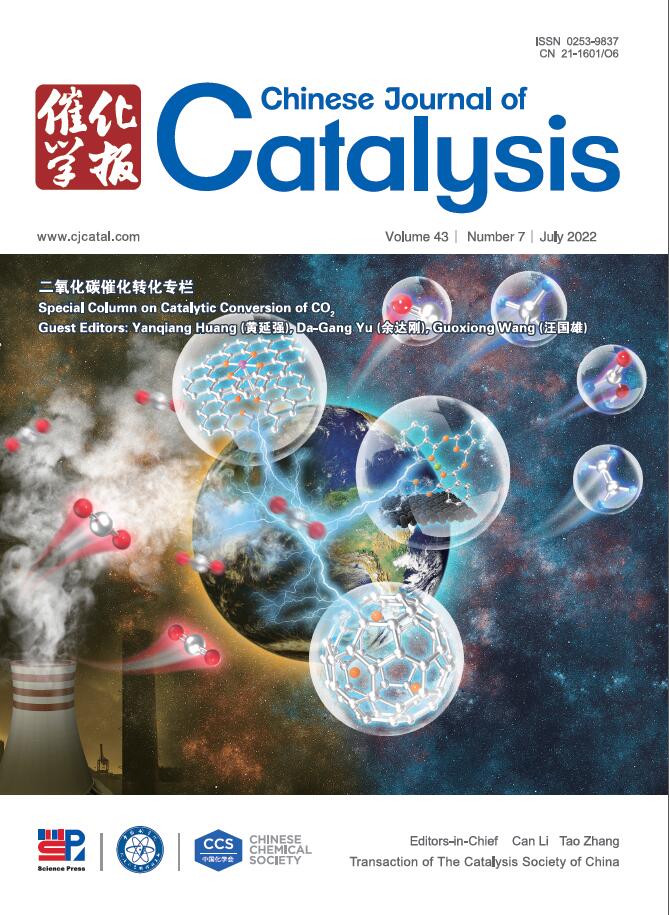PtCu nano-dendrites with enhanced stability in proton exchange membrane fuel cells
IF 15.7
1区 化学
Q1 CHEMISTRY, APPLIED
引用次数: 0
Abstract
The rigorous operating condition of proton exchange membrane fuel cells (PEMFCs) poses a substantial hurdle for the long-term stability of Pt-based alloy catalysts; thus, the development of Pt-alloy catalysts with unique morphologies is crucial for enhancing the stability of PEMFCs. In this study, we synthesized a novel PtCu nano-dendrite (PtCuND) catalyst through a facile, one-step solvothermal process. The sub-nanometer particles and nanopores within this catalyst facilitate enhanced mass transport. In PEM single-cell tests, the PtCuND catalyst displays high activity and robust stability, achieving a mass activity of 0.65 A mgPt–1. Notably, after accelerated durability tests, the mass activity and the voltage at 0.8 A cm–2 of PtCuND exhibits only minimal decreases of 18.5% and 9 mV, respectively. The combined experimental results and theoretical calculations conclusively illustrate the optimized adsorption of oxygen species and the impact of compressive strain on the catalyst surface. The enhanced durability can be attributed to the maintained nano-dendritic morphology and the strengthened interaction within the Pt-Cu bonds. This work not only enhances the stability of PEMFCs but also provides a robust foundation for the future scaling up of catalyst production, paving the way for widespread application in sustainable energy systems.
质子交换膜燃料电池中稳定性增强的PtCu纳米枝晶
质子交换膜燃料电池(PEMFCs)的严格操作条件对pt基合金催化剂的长期稳定性构成了实质性障碍;因此,开发具有独特形貌的pt合金催化剂对于提高pemfc的稳定性至关重要。在这项研究中,我们通过简单的一步溶剂热法合成了一种新型的PtCu纳米枝晶(PtCuND)催化剂。该催化剂中的亚纳米粒子和纳米孔有助于增强质量传递。在PEM单电池测试中,PtCuND催化剂显示出高活性和强大的稳定性,达到0.65 a mgPt-1的质量活性。值得注意的是,经过加速耐久性试验,PtCuND的质量活度和0.8 A cm-2电压分别仅下降了18.5%和9 mV。实验结果与理论计算相结合,最终说明了催化剂对氧的最佳吸附和压缩应变对催化剂表面的影响。增强的耐久性可归因于纳米枝晶形态的保持和Pt-Cu键内相互作用的增强。这项工作不仅提高了pemfc的稳定性,而且为未来扩大催化剂生产规模奠定了坚实的基础,为可持续能源系统的广泛应用铺平了道路。
本文章由计算机程序翻译,如有差异,请以英文原文为准。
求助全文
约1分钟内获得全文
求助全文
来源期刊

Chinese Journal of Catalysis
工程技术-工程:化工
CiteScore
25.80
自引率
10.30%
发文量
235
审稿时长
1.2 months
期刊介绍:
The journal covers a broad scope, encompassing new trends in catalysis for applications in energy production, environmental protection, and the preparation of materials, petroleum chemicals, and fine chemicals. It explores the scientific foundation for preparing and activating catalysts of commercial interest, emphasizing representative models.The focus includes spectroscopic methods for structural characterization, especially in situ techniques, as well as new theoretical methods with practical impact in catalysis and catalytic reactions.The journal delves into the relationship between homogeneous and heterogeneous catalysis and includes theoretical studies on the structure and reactivity of catalysts.Additionally, contributions on photocatalysis, biocatalysis, surface science, and catalysis-related chemical kinetics are welcomed.
 求助内容:
求助内容: 应助结果提醒方式:
应助结果提醒方式:


